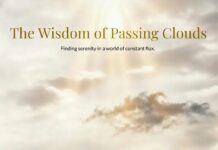Okay. So, today we’re going to uh dive into something that I think a lot of people struggle with, and that is uh anger.
Yeah.
We got this message from a listener who’s dealing with uh their head chef at work.
Mhm.
And um they’re having some real troubles with the chef’s temper. They said it’s like over the smallest things and it’s making them really uncomfortable, but they also still want to try to help.
Oh, wow.
Yeah. It’s interesting, right? But they’re saying like they’re having these really intense feelings of anger like even to the point of like wanting to break things.
Oh my gosh.
And having like angry dreams even.
Wow. That’s
Yeah. So pretty intense.
And uh so we found this really interesting Q&A that digs into this and it’s got some pretty unexpected advice. So I think today we should try to like pull out what’s helpful from this because
uh you know I’m sure a lot of people out there listening have felt this kind of like overwhelming anger in a tough relationship. You know
Definitely it’s so relatable this whole idea of like clashing personalities, especially at work. And you know, it sounds like this listener is really going through it emotionally, right?
Like this push and pull between wanting to help but also feeling so much negativity.
Totally. Yeah. And it’s like they’re stuck in it.
Mhm.
So, um, you know, the advice we’re looking at here, it starts off with this really like in-your-face comparison.
Okay.
It asks the listener to think about like how they might have acted towards their own parents.
Oh, interesting.
When they were younger, right? like when they lost their temper over little things.
Yeah.
You know, the key point is that even when they had those outbursts, their parents probably still took care of them and loved them and were there for them,
right?
So then the advice asked this question which is kind of like whoa,
what is it?
It’s like if our parents could be that tolerant with us, why is it so hard for us to do the same for other people in our lives?
That is such a good point, right?
It totally like flips the script, doesn’t it? Instead of focusing on like what the chef is doing, it’s more about okay, how is the listener reacting and how can they adapt to this situation?
Exactly. And the advice really emphasizes this idea that we all have to deal with different types of people and situations, it’s just life, you know, right?
And it’s saying that if we let anger control us all the time, well, it’s going to mess with our mood. It’s going to mess with our work. And it’s especially tough when this person actually wants to help the chef, you know?
Yeah, absolutely.
Like, how can they actually help if they’re letting the anger get in the way? Totally. And it’s like you said, it’s not sustainable.
And you know, this also connects to what the listener was saying about feeling guilty and having this sense of like bad karma.
Oh, right.
And the advice here kind of suggests that, you know, we’re going to run into these difficult people. It’s just part of life and so we need to learn how to be calm and tolerant. Like that’s a skill we need to develop.
I like that. It’s like saying, “Hey, difficult people exist, so how are you going to deal with it?”
Exactly. Yeah. It puts it back on you.
So then the advice takes this even deeper. Okay.
It brings up this whole concept of karmic debts.
Karmic debts.
Yeah. And it specifically says that the way we act towards our parents has a really big impact.
Interesting.
They call those relationships the fertile ground.
Fertile ground. Okay.
Yeah. Meaning like it’s where a lot of consequences come from.
I see.
So basically, it’s saying that if we have these negative patterns, especially with our parents, it can create these like recurring problems in our lives.
H. So like this intense reaction to the chef could be part of a bigger pattern.
Exactly.
Yeah.
Yeah. And it might be connected to things that happened with her parents in the past.
Wow.
And the advice even says that these issues can keep coming back over and over if we don’t deal with them.
That’s kind of a heavy thought.
It is. It’s pretty intense.
Yeah.
But you know, it’s not all doom and gloom.
Okay.
Because the advice actually gives a way to deal with these karmic debts.
Oh, okay. I’m curious.
It’s attributed to Kyappa Buddha.
Mhm.
And it basically says that our true nature is like pure and it never changes.
Okay.
But our thoughts and our feelings and even our sense of self are kind of like temporary.
Temporary like they’re not who we really are.
Exactly.
Yeah.
Yeah. The advice uses this word illusory.
Illusory. So, like an illusion.
Yeah. So, what it’s saying is that if we can like really see this truth that our true nature is pure and that these negative emotions like anger, they’re not permanent.
Okay.
Then over time we can actually like clear out those karmic debts
So, we can kind of like erase those negative imprints.
Yeah. Exactly.
Wow. That’s pretty powerful,
right? It’s like we have the power to change these patterns.
Yeah.
So, for anyone listening out there, I think there are two big things to take away from all of this.
Okay.
First, think about how tolerant you are with other people
even when it’s hard.
Yeah.
And remember how your parents forgave you even when you messed up.
Mhm.
Can you offer that same understanding to others, even to a difficult.
That’s a good question,
right?
Yeah.
And second, think about this idea of karmic debts, especially with your parents.
Yeah.
And see if maybe recognizing that these negative emotions, they’re not as solid or permanent as they seem, if maybe that could help you resolve some of those deeper issues.
I think that’s something a lot of people could benefit from exploring.
Totally. And it’s like it’s not just about fixing the problem with the chef. It’s about understanding yourself and your relationships on a deeper level.
Absolutely.
So, and this all brings up something else to think about.
That’s that.
where in your life are you holding on to anger or resentment.
And if you could try to be more tolerant and if you could start to see that those negative feelings, maybe they’re not as real as they feel.
Yeah.
How could that change things for you? How could that change how you see those situations and how you interact with the people in your life?
I think that’s a really important question for everyone to ask themselves.
Yeah. It’s like it’s about looking beyond the surface and finding a new way of understanding yourself and your relationships.
It’s about seeing the bigger picture.
Exactly.
It’s not easy, but it could be really transformative.
Definitely. And I think that’s a great place to leave it for today.
Yeah. Thanks for diving into this with me. It’s been really insightful.
Absolutely. Always a pleasure.
All right. Until next time.





